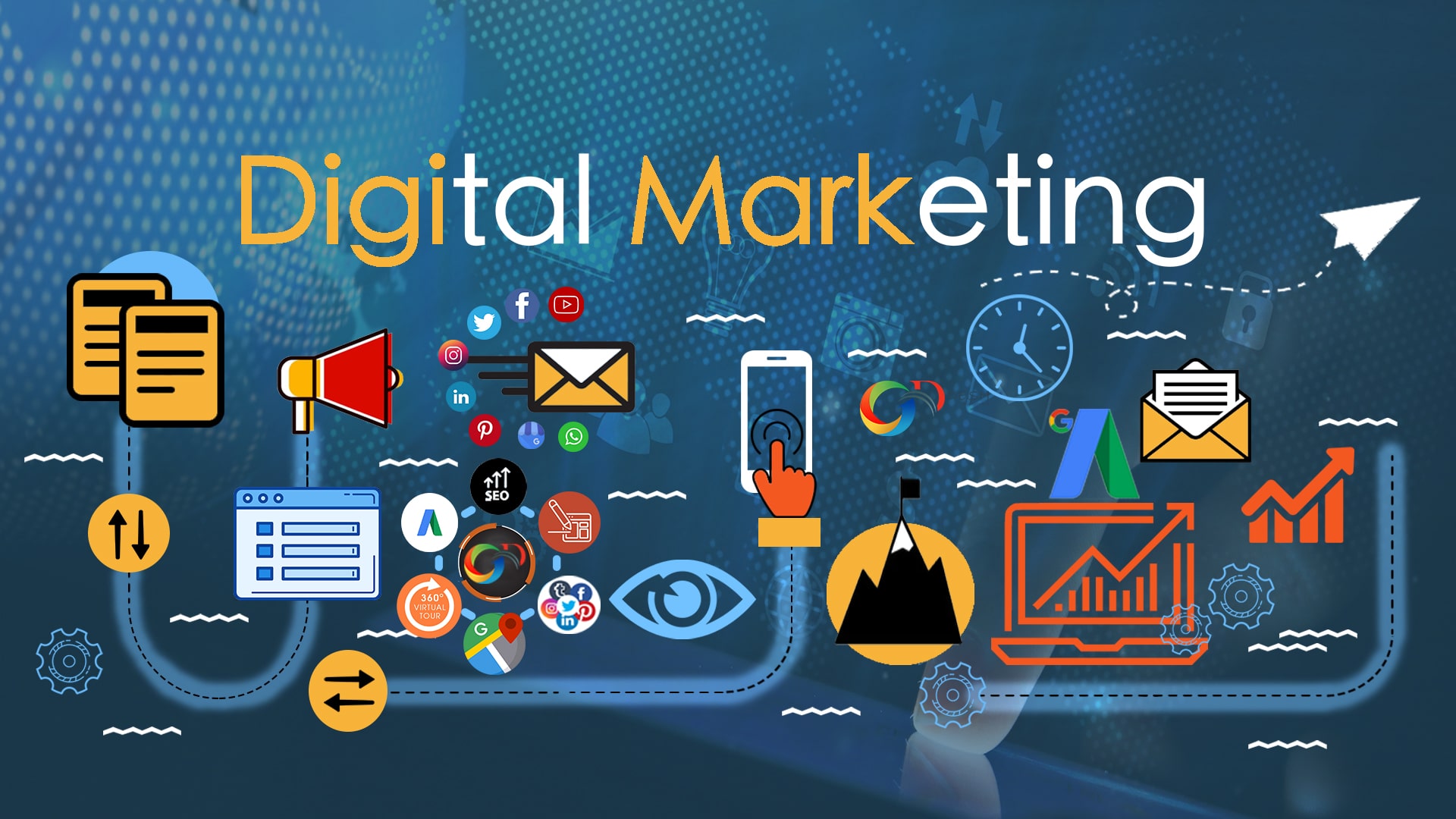Digital Marketing refers to the use of digital channels, platforms, and technologies to promote or advertise products, services, and brands. It encompasses various strategies and tactics that help businesses reach, engage, and convert their target audience through the internet and digital platforms. As the digital world continues to evolve, businesses are leveraging digital marketing to achieve their goals faster, more efficiently, and with greater targeting precision.
Key Components of Digital Marketing:
- Search Engine Optimization (SEO): SEO involves optimizing a website to rank higher in search engine results pages (SERPs), which increases organic traffic. It focuses on both on-page (e.g., content and keywords) and off-page (e.g., backlinks) factors to improve visibility in search engines like Google.
- Content Marketing: Content marketing is creating and sharing valuable content (blogs, videos, infographics, etc.) to attract, engage, and retain customers. It aims to build trust and authority with the audience while driving brand awareness and conversions.
- Social Media Marketing: This strategy involves using social platforms (e.g., Facebook, Instagram, LinkedIn, Twitter) to promote products, services, and content. Social media marketing helps businesses connect directly with customers, build communities, and create brand loyalty.
- Pay-Per-Click Advertising (PPC): PPC is a form of online advertising where advertisers pay a fee each time their ad is clicked. Google Ads and Facebook Ads are common platforms for PPC. It allows businesses to target specific audiences with highly targeted ads.
- Email Marketing: Email marketing involves sending targeted emails to a group of people to nurture leads, promote products, and build relationships with customers. It’s one of the most cost-effective ways to stay connected with prospects and clients.
- Affiliate Marketing: Affiliate marketing is a performance-based strategy where businesses reward external partners (affiliates) for driving traffic or sales through their marketing efforts. Affiliates promote products on their own platforms and earn a commission for each sale or lead generated.
- Influencer Marketing: Influencer marketing leverages individuals with large followings on platforms like Instagram, YouTube, and TikTok to promote products or services. Influencers help businesses reach their target audience through authentic content and endorsements.
- Online Public Relations (PR): Digital PR involves managing a brand’s online reputation through media outreach, social media engagement, and influencer partnerships. It aims to improve the brand’s image and strengthen its relationship with the public.
- Video Marketing: Video marketing is the use of video content to promote or explain a product, service, or brand. Platforms like YouTube, Facebook, and TikTok are widely used for video marketing campaigns to reach large audiences.
- Mobile Marketing: Mobile marketing focuses on reaching customers through mobile devices. This includes app marketing, SMS, push notifications, and mobile-responsive websites.
- Conversion Rate Optimization (CRO): CRO is the practice of improving the effectiveness of a website or landing page to increase the conversion rate (e.g., sales, sign-ups). This involves A/B testing, user experience (UX) improvements, and call-to-action optimizations.
Why is Digital Marketing Important?
- Global Reach: With digital marketing, businesses can reach a global audience, overcoming geographical barriers. It allows small and medium enterprises (SMEs) to compete with larger companies on a level playing field.
- Targeted Audience: Digital marketing enables businesses to target specific demographics, interests, and behaviors. Ads can be shown to users who are more likely to convert, making marketing efforts more cost-effective.
- Cost-Effective: Compared to traditional marketing channels like TV and print, digital marketing is often much more affordable, especially for smaller businesses with limited budgets. Platforms like social media and email allow businesses to reach a wide audience without breaking the bank.
- Measurable Results: Digital marketing campaigns can be tracked and analyzed through analytics tools. This allows businesses to monitor performance in real-time, adjust strategies, and optimize for better results.
- Improved Customer Engagement: Digital marketing fosters two-way communication between businesses and customers. Through social media interactions, email feedback, and online surveys, businesses can better understand their customers’ needs and preferences.
- Better ROI: Because digital marketing allows for precise targeting and budget control, it often yields a higher return on investment (ROI) compared to traditional advertising methods.
Digital Marketing Trends in 2024
- Artificial Intelligence (AI) and Automation: AI is transforming digital marketing with tools like chatbots, predictive analytics, and automated content creation. Automation is streamlining repetitive tasks and improving marketing efficiency.
- Voice Search Optimization: As voice-activated devices become more popular, businesses need to optimize for voice search queries, which tend to be more conversational and question-based.
- Video and Live Streaming: Video content continues to dominate digital marketing strategies, with platforms like TikTok and YouTube seeing massive growth. Live streaming allows businesses to connect with audiences in real-time, creating authentic engagement.
- Augmented Reality (AR) and Virtual Reality (VR): AR and VR are transforming product demonstrations, allowing customers to try products virtually before making a purchase decision. This is especially popular in industries like retail, real estate, and gaming.
- Interactive Content: Consumers increasingly prefer interactive content like polls, quizzes, and interactive videos, which boost engagement and increase time spent on websites and social platforms.
- Social Commerce: Social media platforms are becoming e-commerce hubs, with features like Instagram Shopping and Facebook Marketplace. Social commerce allows users to make purchases directly from their favorite platforms.
Conclusion
Digital marketing is essential for businesses in today’s digital-first world. By leveraging various digital channels and techniques, businesses can effectively reach and engage with their target audience, generate leads, and drive conversions. Staying updated with the latest trends and technologies is key to remaining competitive in the ever-evolving digital landscape. Whether you’re a small startup or a large corporation, investing in digital marketing can help you grow and thrive in 2024 and beyond.

